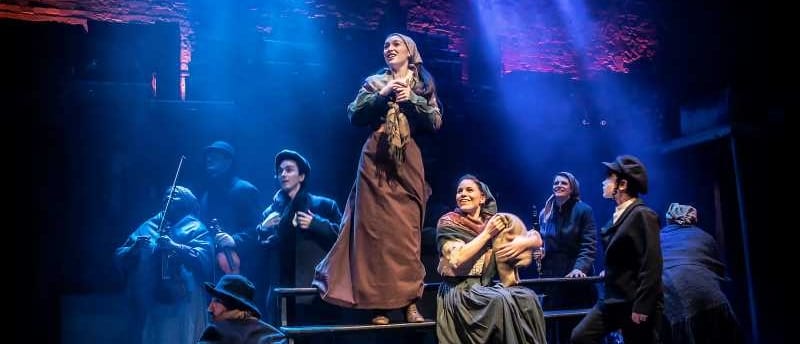Rags tells the story of Rebecca, a Jewish immigrant from Eastern Europe, and her son David. Despite not meeting the immigration restrictions, they make it off the boat to New York City in 1910 and are taken in by an established Jewish family, thanks to the kindly intervention of Bella, a fellow passenger on the boat. Rebecca is a skilled seamstress and makes a real success of the family sweatshop in the Lower East Side, before experiencing a clash of values and opportunities between her Uptown big-shot Jewish patron and his clients and loyalty to her community, where everyone has gone on long-term strike for higher wages. The tug between tradition and assimilation in the identity of the immigrant is at the heart of the story, and gives this piece a certain topicality on both sides of the Atlantic.
This musical saw the light of day in the 1980s when it garnered critical plaudits but flickered only briefly on Broadway. In some ways it is the heir to Fiddler on the Roof, with Joseph Stein as the author of both; but also, we now can see, it was clearly a powerful influence on Ragtime, which came ten years later, with a similar focus on the immigrant experience in the melting pot of early twentieth-century America. But it really deserves this new independent life, especially in David Thompson’s lucid refocusing of the plot and the fresh materials added by the veteran team of Schwartz and Strouse. This production is a transfer from the Manchester warehouse Hope Mill theatre, and arrives with full impact and preparation for London opening.
It’s a most impressive revival, indeed a transformation of the original, if one is honest. Director Bronagh Lagan has assembled a most impressive cast and creative team, with no weak links in either, and production values of sustained excellence. It is a long evening, but does not drag because of snappy dialogue and musical numbers of great variety and interest, merging ‘ragtime’ and klezmer and conventional musical forms. There is comedy aplenty as well as poignancy, skilful movement together with points of repose and reflection, and the show’s creators deserve credit for avoiding obvious and conventional plot solutions.
The Park 200 is small for a piece with a lot of characters and many outdoor scenes of dynamic crowd movement; but the creative team have planned well for this through keeping much of the stage bare except for a few pieces of furniture that suggest ambiance economically. A huge stack of suitcases provides a suitable backdrop, given the governing themes. Costume is period and detailed, as it needs to be in a work focused on garments and their manufacture. Particularly effective is the use of actors who can play instruments – the klezmer players are on stage in the thick of the action and this gambit interleaves music and movement deftly, creating a real flow in the action between the multiplicity of scenes.
In the lead role Carolyn Maitland takes a little while to warm up but then gives a performance of great vigour, heart and vocal confidence. You feel her dilemmas keenly, and it is all better for not being a wholly sympathetic characterisation. The dynamic with her son – a remarkably confident Jude Muir – also work well as does the family setting in the tenement. There are some beautifully detailed characterisations here which will only deepen as the show beds down in the coming weeks. Dave Willetts, as Bella’s widower father, Avram, offers a fine study in scholarly refusal to assimilate that contrasts with his more entrepreneurial brother and sister-in-law, played by Jeremy Rose and Debbie Chazen, with a strong feeling for Jewish tradition and feisty survival instincts. Bella is a somewhat underwritten role, but Martha Kirby does her best with the part of the kindly friend leading a restricted life. This is where the ethos of ‘Fiddler on the Roof’ is most strongly felt.
But there are plenty of contrasted urban figures too, who dramatise the diversity and conflicts of the immigrant experience – the six members of the ensemble take on many roles, both gentle and fierce; and there are delightful character parts for Alex Gibson-Giorgio as Sal, the handsome Italian strike leader and main tenor love interest; Oisin Nolan-Power who takes on the part of Ben, the wannabe songsmith and pianist, and Rachel Izen, who quite steals the show with her “11 o’clock number,” “Three Sunny Rooms,” droll humour, and comic timing.

